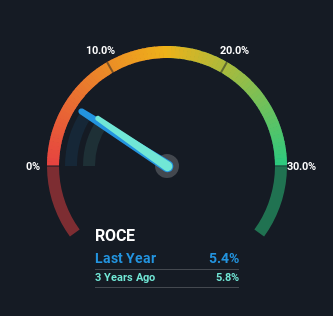- United States
- /
- Other Utilities
- /
- NYSE:BKH
Investors Could Be Concerned With Black Hills' (NYSE:BKH) Returns On Capital

What trends should we look for it we want to identify stocks that can multiply in value over the long term? Amongst other things, we'll want to see two things; firstly, a growing return on capital employed (ROCE) and secondly, an expansion in the company's amount of capital employed. Basically this means that a company has profitable initiatives that it can continue to reinvest in, which is a trait of a compounding machine. However, after investigating Black Hills (NYSE:BKH), we don't think it's current trends fit the mold of a multi-bagger.
Return On Capital Employed (ROCE): What Is It?
For those that aren't sure what ROCE is, it measures the amount of pre-tax profits a company can generate from the capital employed in its business. Analysts use this formula to calculate it for Black Hills:
Return on Capital Employed = Earnings Before Interest and Tax (EBIT) ÷ (Total Assets - Current Liabilities)
0.054 = US$456m ÷ (US$9.5b - US$1.0b) (Based on the trailing twelve months to March 2023).
Therefore, Black Hills has an ROCE of 5.4%. On its own that's a low return on capital but it's in line with the industry's average returns of 5.0%.
Check out our latest analysis for Black Hills

Above you can see how the current ROCE for Black Hills compares to its prior returns on capital, but there's only so much you can tell from the past. If you're interested, you can view the analysts predictions in our free report on analyst forecasts for the company.
SWOT Analysis for Black Hills
- No major strengths identified for BKH.
- Earnings declined over the past year.
- Interest payments on debt are not well covered.
- Dividend is low compared to the top 25% of dividend payers in the Integrated Utilities market.
- Shareholders have been diluted in the past year.
- Annual earnings are forecast to grow for the next 3 years.
- Good value based on P/E ratio compared to estimated Fair P/E ratio.
- Debt is not well covered by operating cash flow.
- Dividends are not covered by cash flow.
- Annual earnings are forecast to grow slower than the American market.
How Are Returns Trending?
On the surface, the trend of ROCE at Black Hills doesn't inspire confidence. Over the last five years, returns on capital have decreased to 5.4% from 7.1% five years ago. However, given capital employed and revenue have both increased it appears that the business is currently pursuing growth, at the consequence of short term returns. If these investments prove successful, this can bode very well for long term stock performance.
The Key Takeaway
In summary, despite lower returns in the short term, we're encouraged to see that Black Hills is reinvesting for growth and has higher sales as a result. In light of this, the stock has only gained 18% over the last five years. Therefore we'd recommend looking further into this stock to confirm if it has the makings of a good investment.
One more thing: We've identified 4 warning signs with Black Hills (at least 1 which is potentially serious) , and understanding them would certainly be useful.
While Black Hills isn't earning the highest return, check out this free list of companies that are earning high returns on equity with solid balance sheets.
If you're looking to trade Black Hills, open an account with the lowest-cost platform trusted by professionals, Interactive Brokers.
With clients in over 200 countries and territories, and access to 160 markets, IBKR lets you trade stocks, options, futures, forex, bonds and funds from a single integrated account.
Enjoy no hidden fees, no account minimums, and FX conversion rates as low as 0.03%, far better than what most brokers offer.
Sponsored ContentValuation is complex, but we're here to simplify it.
Discover if Black Hills might be undervalued or overvalued with our detailed analysis, featuring fair value estimates, potential risks, dividends, insider trades, and its financial condition.
Access Free AnalysisHave feedback on this article? Concerned about the content? Get in touch with us directly. Alternatively, email editorial-team (at) simplywallst.com.
This article by Simply Wall St is general in nature. We provide commentary based on historical data and analyst forecasts only using an unbiased methodology and our articles are not intended to be financial advice. It does not constitute a recommendation to buy or sell any stock, and does not take account of your objectives, or your financial situation. We aim to bring you long-term focused analysis driven by fundamental data. Note that our analysis may not factor in the latest price-sensitive company announcements or qualitative material. Simply Wall St has no position in any stocks mentioned.
About NYSE:BKH
Black Hills
Through its subsidiaries, operates as an electric and natural gas utility company in the United States.
Average dividend payer and fair value.
Similar Companies
Market Insights
Community Narratives



